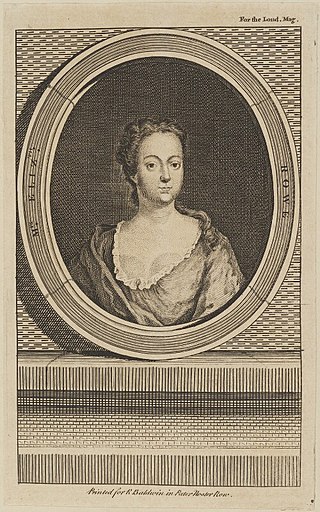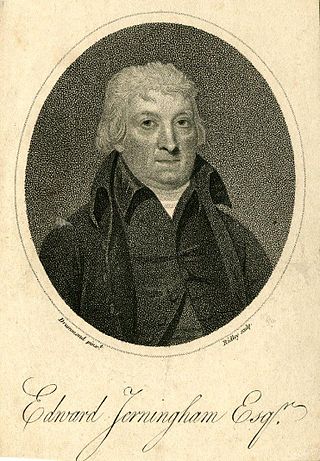
Alexander Pope was an English poet, translator, and satirist of the Enlightenment era who is considered one of the most prominent English poets of the early 18th century. An exponent of Augustan literature, Pope is best known for his satirical and discursive poetry including The Rape of the Lock, The Dunciad, and An Essay on Criticism, and for his translations of Homer.

William Cowper was an English poet and Anglican hymnwriter.
This article contains information about the literary events and publications of 1713.

Martin Madan was an English barrister, clergyman and writer, known for his contribution to Methodist music, 'The Lock Hospital Collection,' and later controversial views on marriage expressed in his book Thelyphthora.

William Cowper, 1st Earl Cowper, was an English politician who became the first Lord High Chancellor of Great Britain. Cowper was the son of Sir William Cowper, 2nd Baronet, of Ratling Court, Kent, a Whig member of parliament of some mark in the two last Stuart reigns.

Eloisa to Abelard is a verse epistle by Alexander Pope that was published in 1717 and based on a well-known medieval story. Itself an imitation of a Latin poetic genre, its immediate fame resulted in a large number of English imitations throughout the rest of the century and other poems more loosely based on its themes thereafter. Translations of varying levels of faithfulness appeared across Europe, starting in the 1750s and reaching a peak towards the end of the 18th century and the start of the 19th. These were in the vanguard of the shift away from Classicism and towards the primacy given emotion over reason that heralded Romanticism. Artistic depictions of the poem's themes were often reproduced as prints illustrating the poem; there were also paintings in France of the women readers of the amorous correspondence between the lovers.

Nationality words link to articles with information on the nation's poetry or literature.
Nationality words link to articles with information on the nation's poetry or literature.
Nationality words link to articles with information on the nation's poetry or literature.

Frances Greville was an Anglo-Irish poet and celebrity in Georgian England.

Elizabeth Singer Rowe was an English poet, essayist and fiction writer called "the ornament of her sex and age" and the "Heavenly Singer". She was among 18th-century England's most widely read authors. She wrote mainly religious poetry, but her best-known work, Friendship in Death (1728), is a Jansenist miscellany of imaginary letters from the dead to the living. Despite a posthumous reputation as a pious, bereaved recluse, Rowe corresponded widely and was involved in local concerns at Frome in her native Somerset. She remained popular into the 19th century on both sides of the Atlantic and in translation. Though little read today, scholars have called her stylistically and thematically radical for her time.
Cowper is a surname of several persons:

Spencer Cowper was an English lawyer and politician who sat in the English and British House of Commons between 1705 and 1727.
Colonel Martin Madan (1700–1756) was groom of the bedchamber to Frederick, Prince of Wales, and MP for Wootton Basset from 1742 to 1747. Madan also served as a colonel in the Dragoon Guards.
Madan/Madaan/Madhan is a Hindu surname. In India, it is found among Parsis, Kashmiri Pandits, Punjabi Aroras and Sindhi Lohanas. It is also found among Europeans.

Edward Jerningham was a poet who moved in high society during the second half of the 18th century. Born at the family home of Costessey Park in 1737, he died in London on 17 November 1812. A writer of liberal views, he was savagely satirised later in life.
James Cawthorn was born in Sheffield on 4 November 1719 and died in Tonbridge on 15 April 1761. A school master in holy orders, he was a minor English poet and imitator of Alexander Pope.

Sarah Cowper was an English diarist.

Frances Maria Cecilia Cowper, sometimes known as Maria Frances, was a religious poet and part of the Madan-Maitland literary coterie.












